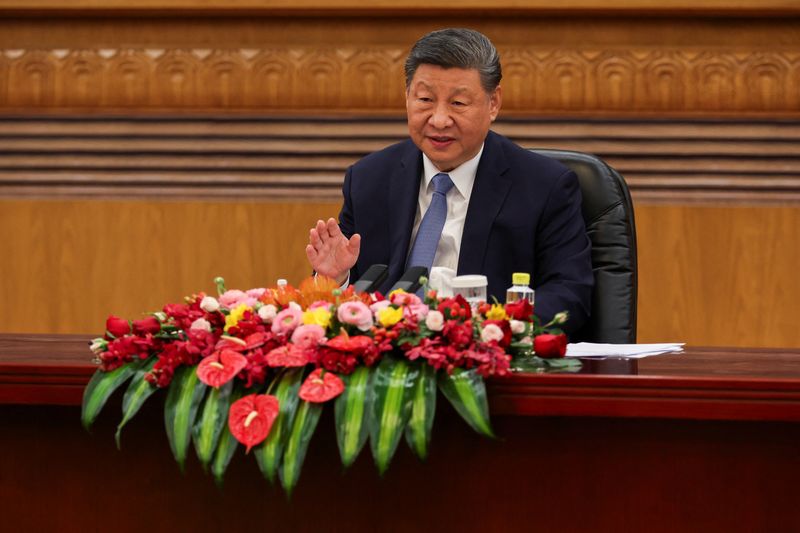
By Joe Cash and Casey Hall
BEIJING (Reuters) -China’s President Xi Jinping urged a gathering of multinational CEOs on Friday to protect global industry and supply chains, as Beijing seeks to assuage foreign firms’ concerns over the Chinese economy’s health amid threats of more U.S. tariffs.
Beijing is battling to dispel fears that a renewed trade war with U.S. President Donald Trump will further pinch growth in the world’s second-largest economy, which has been struggling to recover since the pandemic.
Longstanding unease over China’s tightening regulations, abrupt crackdowns on foreign firms, and an uneven playing field favouring state-owned Chinese companies are also sapping business sentiment.
“We need to work together to maintain the stability of global industry and supply chains, which is an important guarantee for the healthy development of the world economy,” Xi told the business leaders, who included the bosses of AstraZeneca, FedEx, Saudi Aramco, Standard Chartered and Toyota.
Around 40 executives joined the meeting, the majority of whom represented the pharmaceuticals sector. The meeting ran for just over 90 minutes and seven companies were invited to speak, a source with direct knowledge of its planning said.
“The CEOs I spoke with, and I spoke with a lot of them, felt it was worth it,” said Sean Stein, president of the U.S.-China Business Council and one of the meeting’s attendees. “Not only did the president acknowledge various challenges facing companies and industry, in many cases he pledged the government would take action.”
The executives sat in a horseshoe formation, with Mercedes-Benz CEO Ola Kallenius and FedEx’s Raj Subramaniam sitting directly across from Xi.
HSBC CEO Georges Elhedery, SK Hynix boss Kwak Noh-jung, Saudi Aramco president and CEO Amin Nasser, and chair of Hitachi Toshiaki Higashihara also sat in the first row.
“This meeting is a big illustration of business diplomacy. Now there is not just dialogue between bodies, WTO entities and states, but diplomacy being led by companies that are not just representing themselves, but also their sectors,” said Frank Bournois, VP and dean of the China Europe International Business School in Shanghai, adding that its success would depend on future actions and not just words.
The frequency of meetings between foreign executives and high-level Chinese officials has picked up over the past month, after official data showed foreign direct investment plummeted 27.1% year-on-year in local currency terms in 2024.